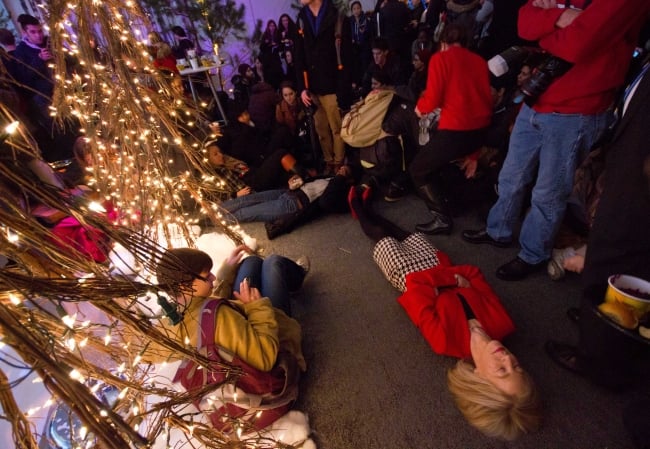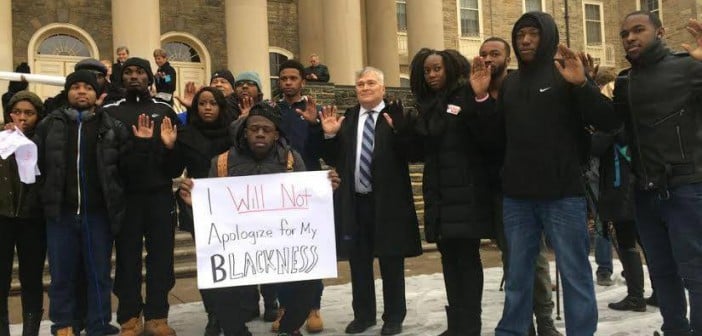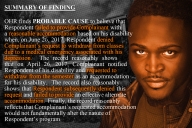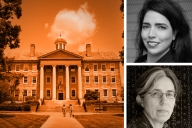You have /5 articles left.
Sign up for a free account or log in.

Penn's president joins a die-in held at her holiday party.
Luke Chen, The Daily Pennsylvanian
When protesters turned up at the student holiday party thrown by Amy Gutmann, president of the University of Pennsylvania, she joined in (at least in part). The students wanted Penn to pay more to the City of Philadelphia for its public school system, which Gutmann declined to do, although she noted how much Penn does for the public schools. And the protesters wanted to stage a die-in, as many have been doing nationwide to draw attention to the way grand juries have declined to indict police officers who have killed unarmed black men.
Gutmann joined the die-in, and got down on the floor to fully participate for several minutes.
Not everyone on the Penn campus was pleased by her public stance.
Eric J. Rohrback, president of the Penn Police Association, published a letter in The Daily Pennsylvanian, the student newspaper, in which he took issue with what Gutmann did.
"I am appalled that the president of this fine university would give in to the pressures of the uninformed mob mentality surrounding the Michael Brown case and participate in a 'die-in,' " Rohrback wrote. "No one condones police brutality. Nevertheless, conveniently glossed over by the protestors and many media accounts are these facts: The grand jury report disputed all eyewitness testimony and fully exonerated the officer. Our president is fond of calling us 'her' officers, and publicly states that she will always support us. To have her participate in such a disrespectful act is not, in any way, 'support,' and proves that she does not have the backs of 'her' officers. It is a slap in the face to every person that wears this uniform and serves this university."
A Penn spokeswoman said that the university wasn't responding to the letter. But Penn's vice president for public safety, Maureen Rush, sent the student paper her own letter to police officers, in which she stressed Gutmann's strong support for the campus police. Rush said she understood that some police officers were "upset with the president's gesture," and then explained how it came about.
"Unfortunately, about 50 students chose to use this event as an opportunity to ambush President Gutmann and to prematurely end the party and fun for several hundred students who were cycling through the event," Rush wrote. "President Gutmann attempted to respond to the protesters by using a microphone and they continued to shout her down. Suddenly the students performed a 'die in.' President Gutmann instinctively laid down on the ground in solidarity with the students. Unfortunately, in this day and age, virtually every student has a cell phone and they immediately snapped pictures."
 Gutmann is not the only president facing scrutiny over a gesture of support for student protesters concerned about police treatment of black men. Eric Barron, president of Pennsylvania State University, posed for a photo at a "hands up" protest in which students raised their hands to illustrate the idea that police officers are killing those who pose no danger.
Gutmann is not the only president facing scrutiny over a gesture of support for student protesters concerned about police treatment of black men. Eric Barron, president of Pennsylvania State University, posed for a photo at a "hands up" protest in which students raised their hands to illustrate the idea that police officers are killing those who pose no danger.
Some Republican legislators demanded that Barron either apologize or quit. State Representative Jerry Knowles issued this statement: "Barron was photographed among student protesters in the ‘hands up’ position, and as a former police officer, I know I am not alone in taking offense to such a gesture. I think it is unbelievable that the president of the university would show such disrespect to police officers, including its own campus police."
Barron told the Faculty Senate that he viewed his gesture as one of supporting students who feel vulnerable, not one of taking a political stand. “I’m not making a political statement. I’m not making a statement about police. I’m making a statement about vulnerability and the degree to which we have to up our game in terms of the climate of this university and our feeling of inclusion,” he said, according to a report in The Centre Daily Times.
And while Barron was criticized by some legislators, at least one praised him. In a letter to Barron, Representative Jake Wheatley, a Democrat, sent Penn State's president a letter in which he said: "I applaud your courage and that of young adults at Penn State and elsewhere who are standing up and asking their country to stop and see our imperfection and to do something to change it."
Other college and university leaders have seen different kinds of scrutiny for statements or actions about the recent grand jury decisions. Smith College President Kathleen McCartney issued an apology after an email she sent out campuswide about the concerns over the grand jury decisions in Missouri and New York had the subject line "All Lives Matter." She said she intended the message as one of support for those angered and feeling vulnerable about recent events, but was criticized nonetheless. The phrase she used that is used (she indicated she was unaware of this) by some supporters of the police to counter the "Black Lives Matter" slogan used by many protesters.
And some college presidents have spoken out about recent events and said that they should inspire institutions to consider their own role in promoting diversity and equity. Christopher L. Eisgruber, president of Princeton University, released a statement in which he said that "the tragic deaths of Michael Brown in Ferguson, Missouri, and Eric Garner in Staten Island, New York, have again exposed the distressing gap that separates our aspirations from our achievements. Our Constitution's promise of equal protection of the laws remains unfulfilled, and the American people's dream of justice remains unrealized. Protests across the country and on our own campus testify eloquently to the anguish caused by the unfairness that persists within American society."
He asked Princeton committees to "develop recommendations for improving the university's policies and practices regarding diversity, inclusion and equity on campus" and to "propose events in the upcoming months that will enhance public dialogue about racial equality, diversity and other topics critical to the future of our university and our country."
When Should a President Speak Out?
Most presidents have a high bar for speaking out on issues that do not directly relate to their institutions. Many presidents who speak out regularly about state appropriations for higher education or the Pell Grant budget hesitate before commenting on most other issues. So the recent events raise a question that is periodically an intense one: When should a president speak out on issues of concern -- or participate in public protests?
Molly Broad, president of the American Council on Education, said in an interview that while the presidents of Penn and Penn State are being criticized by some for joining in protests, many in academe and the public regularly call for academic leaders to speak out "and take national leadership roles," adding that "you regularly hear people say that presidents are no longer speaking out."
The Rev. Theodore Hesburgh, formerly president of the University of Notre Dame, is the name everyone cites, Broad noted, because of his leadership role on the U.S. Commission on Civil Rights. In that role, Father Hesburgh spoke out on civil rights issues of his day, issues that weren't in any way restricted to Notre Dame or higher education. In much the same way, of course, the protests over police killings are about civil rights.
Broad noted, however, that today's presidents operate in an environment different from that of the Hesburgh era. People remember the way Father Hesburgh spoke out, but not the way he was able to be "deliberative" and to study issues before speaking out, Broad said. In a 24/7 news cycle, with everyone taking videos and photographs, Broad said, it's more difficult to be deliberative.
"I hope we have presidents of that stature leading higher education today. but we have to acknowledge that Ted Hesburgh had a much longer timeline to deal with issues than we do today," Broad said.
She declined to say whether she would have joined a die-in or hands-up protest, and said that these are judgments to be made by individual presidents, based on their knowledge of their institutions and their constituencies. She said that long-term presidents (such as Gutmann) are likely in a better position to make quick judgments.
In On Being Presidential (Wiley), Susan Resneck Pierce writes that "[d]espite all disclaimers to the contrary, listeners will assume that anything and everything presidents say is on behalf of their institutions and not merely their personal opinion. Thus, in every instance, presidents need to weigh the costs as well as the benefits of their speaking out." Pierce is president emerita of the University of Puget Sound, a consultant and author of numerous columns for Inside Higher Ed.
In an interview, Pierce noted that very small changes in presidents' statements and actions can have a big impact in how they are viewed. If Barron had just praised Penn State students for engaging in a peaceful protest, or if Gutmann had just had a discussion with protesters, "no one would have noticed." But because the presidents "joined their students in the symbolic actions that have become signatures of these protests," the actions drew lots of attention.
These situations "demonstrate the complexity of presidents needing to make spontaneous judgments and decisions about political matters in public settings," Pierce said. "Presidents always need to be mindful as they can of the consequences of what they say and do. It is also the case that presidents often need to make decisions that they know will be controversial but which they believe are in the institution’s best interests."
Pierce said that, in the end, "I don’t believe that there are rules that govern such situations. There is only the very real burden for presidents of needing to make informed judgments, keeping the interests of the institution as they define it foremost in their minds."
David G. Brown, who has served as chancellor of the University of North Carolina at Asheville and provost of Wake Forest University, and who was editor of the collection University Presidents as Moral Leaders, said via email that presidents have the responsibility of making sure that their institutions are open to all ideas. But he also said that, sometimes, it is entirely appropriate for presidents to speak out, even if everyone won't agree.
"Presidents personify universities. Routinely presidents must make sure that all views are aired, that difference is tolerated, that openness is practiced," Brown said. "Beyond this, university presidents must earn and maintain the respect and trust of multiple constituencies -- liberal and conservative, young and old, American and worldwide. Capitalizing on this trust and the 'bully pulpit' that accompanies it, university presidents can and must articulate controversial views. If their passion is high and the cause is worthy, presidents should speak out. If trust is to be maintained the topics and occasions must be chosen carefully. When a president's voice can most likely make a real difference, the moral responsibility is to speak up."
Still, the mix of students, politics and presidents is complicated. In 2006, Gutmann hosted a Halloween party at her home, posing with students in costumes, and was criticized for posing with a student dressed as a suicide bomber.
And when Gutmann has not agreed with protesters, they have not always wanted to listen to her. At last week's party, while she joined in the die-in, she was shouted at when she didn't agree to commit more money to the public schools:








